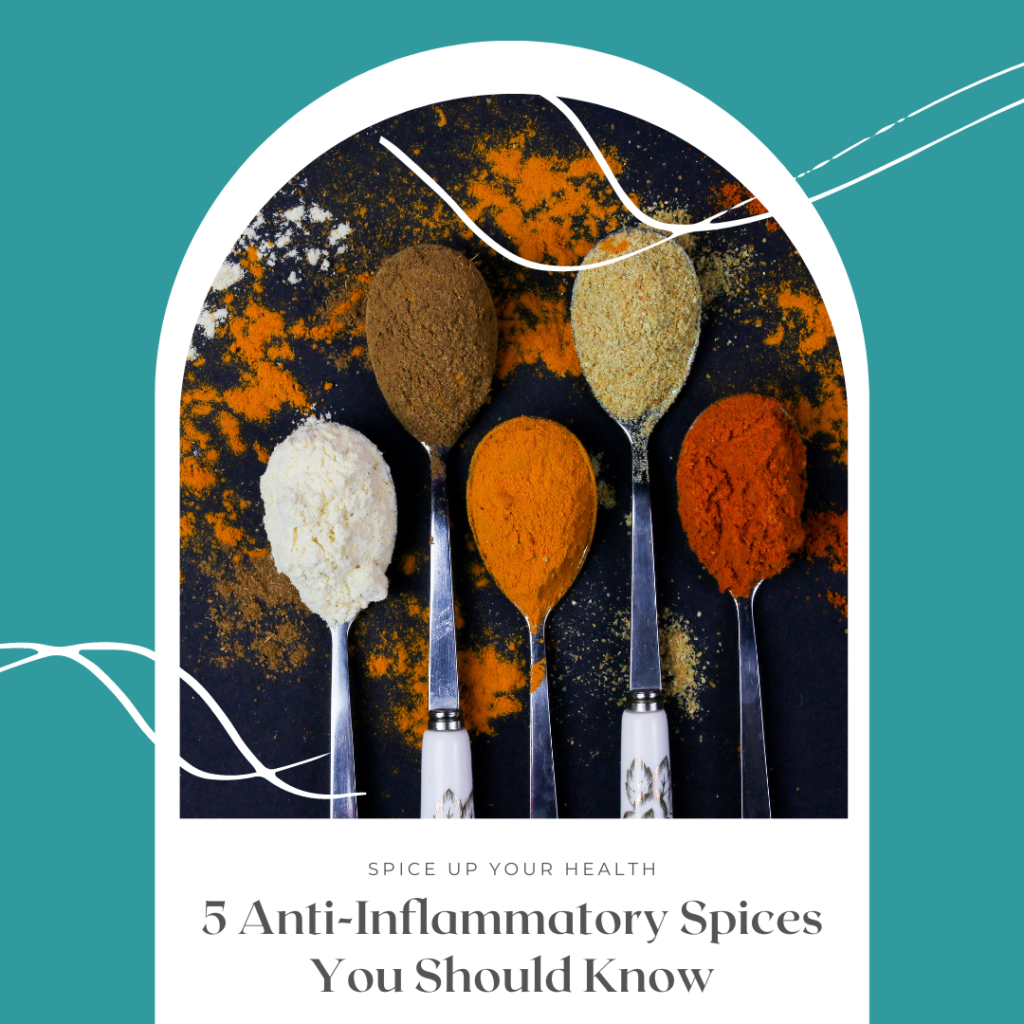
Inflammation is a natural response of the body to injury or infection, and our body has the ability to resolve it and clean it right away… But, UNFORTUNATELY we, all of us, are suffering from chronic inflammation that causes various distractions in our overall health. One way to combat inflammation is through diet, and it is the most promising way… because we have full control, unlike the environment factor. O’Neill says: “Because we live in this fast-paced, on-the-go society, a lot of our food is packaged and pre-prepared. A lot of these potent antioxidants are lacking from our diet.” So, incorporating anti-inflammatory spices into your meals is a simple and delicious way to do so. Since I am from the Middle East, spice is a must in our food, and I’ll share some in this post.
5 Anti-Inflammatory Spices You Should Know
Turmeric

Turmeric is a bright yellow spice commonly used in Indian and Middle Eastern cuisine. And as a whole plant, it shows a promising impact on our health. Not mentioning the countless research that showed the benefits of turmeric on inflammation. Dr. Berg says: “ I don’t think that one health condition that you couldn’t find some benefit from taking turmeric”. As example: Turmeric contains a compound called curcumin, that shown to have powerful anti-inflammatory properties. Curcumin works by blocking the activity of certain enzymes that contribute to inflammation. Moreover, it has potential benefits on the brain, digestive system, cardiovascular system, skin, liver, DNA repair and more…. By the way, Dr. Berg added that Turmeric has no major side effects even when taking it in large quantities…. But I prefer to say balance is the key!!!
Ginger

My Mom mixes it with garlic. She makes the perfect garlic – ginger paste.
Ginger originated from China and is another popular spice that has been shown to have anti-inflammatory effects. It contains compounds called gingerols, which have many medicinal properties that alleviate pains, including joint pain, menstrual cycle pain, and muscle soreness. It makes wonders in anything you suffer in your stomach, starting from morning sickness, nausea to any inflammation. Note that it takes a little time to saturate your system to notice the benefit therefore you have to take it regularly.
Actually, There is enough evidence to prove that ginger possesses multiple biological activities, especially antioxidant and anti-inflammatory capacities.
Cinnamon

Cinnamon is a sweet and fragrant spice commonly used in baking. Moreover, Cinnamon known in Asia for more than 4000 years. Traditionally used to treat inflammatory disorders. And found to be a great alternative to sugar. It isn’t as sweet… but controls your cravings, spikes insulin resistance and more. It is one of the spices that has the highest antioxidant values. It contains compounds called cinnamaldehyde and cinnamic acid, that have shown to have anti-inflammatory effects.
Chili Pepper

My favorite <3. It contains a chemical that is responsible for the pungent taste. This chemical called Capsaicin, which demonstrated broad potent biological characteristics, including antioxidant, anti-obesity, and anti-inflammation effects. Moreover, it has the potential to block the sensory nerve signals that come from pain or inflammation, meaning alleviating pain!!! But careful with high doses, it causes heartburn and other digestive discomfort.
Black Pepper

Black pepper, a common spice, used in almost every cuisine around the world. It contains a compound called piperine. This compound has shown to have anti-inflammatory effects. Moreover, black pepper has the ability to increase the bioavailability of other compounds up to 2000%!!! It makes a lot and various compounds readily and easily absorbed. So it is very good in combinations of certain things, but not really recommended in combination with something TOXIC!!!
Conclusion,
incorporating anti-inflammatory spices into your meals is a simple and delicious way to support your health. Whether you’re adding turmeric to your morning smoothie or sprinkling cinnamon on your oatmeal, these spices can help reduce inflammation and promote overall wellness. Note, they are not a replacement of your medications,, but if it can alleviate discomfort and pain,,,why not?!! And they barely cause any side effects… So go ahead and spice up your life – your body will thank you for it!
References:
https://www.healthline.com/health/osteoarthritis/turmeric-and-anti-inflammatory-herbs

Great post. I have been slowly incorporating better foods as well into my diet!
This is such great information! I just started looking into foods that make people bloat, this was a great resource for anti-inflammatory spices to use!
I use a lot of cinnamon, black and red pepper, but need to incorporate more turmeric and ginger. Thanks for sharing!
Such a helpful article! Thank you so much
Woow nice spices to anti inflammatory.
I love all of these so it’s good to know they are good for me. Thank you for your well written post.
This was really interesting! I didn’t know this about all these spices. I did know about some of the benefits of ginger and can definitely notice them when I make an effort to include more of it in my diet. One of my favourite ways to get more ginger is to make a ginger tea by literally just seeping raw ginger in boiling water! Anyway, after reading your article I think I will try to use more turmeric as well!
Thank you so much for sharing all about these spices, I did not know this.
you are more than welcome 🙂
Need to add more of these into my daily diet!
Cinnamon and turmeric are my go-tos 😉
Love them. Thanks so much for sharing, next to include more of is chillie!!
I use cinnamon and turmeric often. I read once that turmeric requires black pepper to be better absorbed or activated (or something). I’m unsure if that’s true, but I developed the habit of adding pepper whenever I use turmeric.
It is true 🙂
I use all of these. Thanks for sharing!
I love using herbs for preventative health. We’re growing a food forest in Costa Rica and can actually grow all of these. I harvested my first turmeric last year!